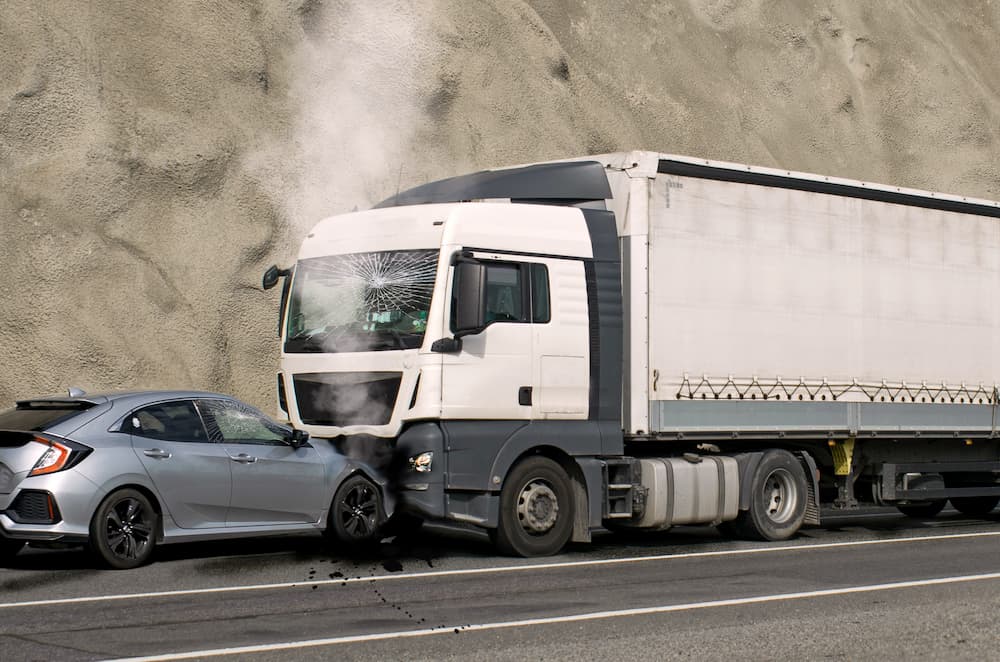- What is commercial auto insurance?
- What does commercial auto insurance cover?
- Who needs commercial auto insurance?
- How much commercial auto insurance does a small business owner need?
- What coverages do you need on your commercial auto insurance policy?
- How commercial auto insurance requirements can vary by state
- Which companies offer commercial auto?
- Factors to consider when buying commercial auto insurance
- Average cost for commercial auto and how to get the best rates
- FAQs
What is commercial auto insurance?
Commercial auto insurance provides liability and physical damage coverage for company-owned vehicles and other cars, trucks and vans used for business purposes. It can cover personal vehicles, food trucks, dump trucks, trailers, limousines, buses and SUVs.
Personal auto policies don’t cover company vehicles and typically won’t cover the use of your personal vehicles for business purposes. That’s why it’s important for business owners to buy commercial auto coverage, which can cover business and personal use. Having the right policy and coverage in place is the best way to protect your business finances.
What does commercial auto insurance cover?
The types of commercial auto insurance coverage you can get vary by company and can be tailored to your specific business, vehicle and industry.
A basic business auto policy includes bodily injury and property damage liability to pay for damage you or your drivers cause to others during an accident. Medical payments coverage pays your drivers and their passengers' medical bills if they get injured in an accident. Uninsured/underinsured motorist coverage pays if someone hits one of your business vehicles and doesn’t have enough liability coverage or doesn’t have any insurance.
Comprehensive and collision coverage will cover physical damage to your commercial vehicles and is required on financed or leased vehicles. Comprehensive covers non-collision events, like fire, theft, natural disasters, vandalism, broken glass and animal damage. Collision covers accidents and collisions with another vehicle or object.
You can also include optional coverages to meet your specific needs, like hired auto insurance, which extends your coverages to vehicles you rent, borrow or lease. Any auto coverage and non-owned auto insurance also will cover your employees' personal vehicles if they use them for business purposes.
If your trucks haul cargo or pull trailers, you can also include coverage extending comprehensive and collision coverages to your freight and trailers. Without this coverage, you may suffer financial losses if you lose or damage a customer's freight or trailer.
Expert insight: Commercial auto insurers may cap liability coverage at $1 million. If your assets are more than that, a commercial liability umbrella policy is worth considering.
Who needs commercial auto insurance?
You need commercial auto insurance if you and your employees use vehicles for business reasons. This includes small businesses that lease or own pickup trucks, vans, cars and other vehicles that transport people, equipment and goods, such as:
- Delivery companies that use business vehicles to transport goods to customers, like florists, moving companies, courier services, medicine, prepped meals and groceries.
- Tradespeople such as landscapers, mobile mechanics, construction companies, electricians, painters and contractors who transport equipment and tools between job sites.
- Food service companies like caterers, food trucks and restaurants that operate mobile kitchens or deliver food to people.
- Transportation services that carry passengers, including limousines and taxis.
- Non-profit organizations that transport clients or volunteers using vans, buses, SUVs and other multi-passenger vehicles.
- Service industries like real estate, insurance agents, consultants and sales professionals who transport clients or materials.
How much commercial auto insurance does a small business owner need?
Commercial auto insurance needs vary by business; there is no perfect coverage amount for everyone. If you or one of your drivers cause an accident, your business can be held responsible for the injuries and property damage. Insurance experts recommend purchasing enough commercial auto liability insurance to cover your business assets in case of an auto accident.
Commercial auto insurers may cap liability coverage at $1 million. If your assets are more than that, a commercial liability umbrella policy is worth considering, which will kick in if you exhaust the liability limits on your commercial auto policy and other commercial policies like a general liability policy.
If you think that’s excessive, consider this: America is a litigious country and someone injured by a business-owned vehicle may be more likely to seek representation and file a lawsuit.
The American Transportation Research Institute (ATRI), a trucking industry group that conducts research and tests, analyzed 600 cases from 2006 to 2019. From 2006 to 2011, only 26 cases received a verdict of $1 million or more. From 2014 to 2019, cases rose to 300. Verdicts of more than $10 million almost doubled during the same period. Award sizes grew nearly 52% annually from 2010 to 2018, while standard inflation only rose 1.7% and healthcare costs increased 2.9% annually.
Having the right amount of commercial auto insurance can protect the business you’ve worked so hard to create and grow. Working with a knowledgeable independent insurance agent can ensure you get the coverage you need from the insurance company that will fit your specific needs.
What coverages do you need on your commercial auto insurance policy?
The coverage you need depends on your industry, profession, risk, vehicles and business assets. As long as your commercial auto insurance coverage meets or exceeds your state’s minimum requirements, you can tailor your policy to your company’s needs.
Working with an experienced commercial insurance agent is crucial to getting the coverage your business requires. Independent insurance agents work with a network of commercial insurance companies to find the best coverage and policy to protect you from financial losses.
How commercial auto insurance requirements can vary by state
Each state has its own laws that drivers must follow, whether they’re driving for personal or business purposes. New Hampshire is the only state that doesn’t have minimum coverage requirements. However, drivers are still financially responsible if they cause an accident.
All state laws include some level of liability insurance, which pays for injuries and property damage you cause others. Some states also require other coverages, such as personal injury protection (PIP) and uninsured motorist (UM) coverage. We have a few examples below.
But small business owners need to remember that state minimums are for liability insurance and won’t provide coverage for injuries to you or your passengers, or damage to your vehicles. Experts say you should get more than the state minimum and consider comprehensive and collision insurance to be properly insured.
| State | Liability insurance coverage minimum requirements | Personal injury protection coverage minimum requirements | Uninsured motorist coverage minimum requirements |
|---|---|---|---|
| Colorado | $25,000 per person, $50,000 per accident for bodily injury$15,000 per accident for property damage | ||
| Delaware | $25,000 per person, $50,000 per accident for bodily injury$10,000 per accident for property damage | $10,000 per person, $30,000 per accident | |
| Iowa | $20,000 per person, $40,000 per accident for bodily injury$15,000 per accident for property damage | ||
| Missouri | $25,000 per person, $50,000 per accident for bodily injury$25,000 per accident for property damage | $25,000 per person, $50,000 per accident for bodily injury | |
| North Dakota | $25,000 per person, $50,000 per accident for bodily injury$25,000 per accident for property damage | $30,000 per person | $25,000 per person, $50,000 per accident for bodily injury |
If your trucks haul property or hazardous materials, you will have to comply with state and motor carrier laws. Failing to meet minimum coverage requirements can result in severe penalties, including fines, jail time, license suspension and vehicle registration suspension.
Which companies offer commercial auto?
Many auto insurance companies offer commercial policies for small businesses. Here are the top 10 largest commercial auto insurance companies by market share, according to the National Association of Insurance Commissioners:
- Progressive
- Travelers
- Liberty Mutual
- Old Republic Insurance Group
- Zurich
- Berkshire Hathaway
- Auto Owners
- State Farm
- Berkley Insurance
- Nationwide
Factors to consider when buying commercial auto insurance
Consider the following factors when buying commercial auto insurance for your small business:
- Vehicle type and usage: The number and types of vehicles your business owns and how you use them factor into the cost of business auto insurance. Expensive vehicles with more features and permanent attachments, like a ladder rack or toolbox, are typically more costly to insure. And the more you drive, the higher your risk of being involved in an accident, which drives up premiums.
- Driver’s history: The insurance company will consider every driver’s ticket and claims history to determine how much you’ll pay for business auto insurance. Drivers with poor driving records can cause higher rates or cause your application for coverage to be denied.
- Coverage limits: Higher liability limits and additional coverages, such as hired and non-owned vehicle insurance — which extend your policy’s liability insurance to vehicles you hire, borrow or rent for business purposes — are more expensive, but they provide greater protection for your business. You may also need special coverage if you transport hazardous materials or property.
- Business location: Another factor insurers use to determine rates is your business location. If your business operates with a higher crime rate or more natural disasters, you may pay more for commercial auto insurance coverage.
- Deductibles: Comprehensive and collision coverages require you to choose a deductible — the amount you pay toward vehicle repairs before the insurer pays its portion. Choosing a higher deductible will lower your premium but increase your out-of-pocket costs if you file a claim.
Average cost for commercial auto and how to get the best rates
The cost of commercial auto policies varies greatly depending on the business, the vehicles, the business’s location, the coverage selected and other factors. Insurance agency Insureon says its small business customers pay an average of $147 per month for commercial auto insurance.
Average yearly rates for commercial auto insurance in the five most populous states:
- California: $1,352
- Texas: $2,610
- Florida: $3,192
- New York: $2,065
- Pennsylvania: $2,012
Average yearly rates for commercial auto insurance for five small business types:
- Cleaning service: $2,075
- Construction: $2,075
- Food and beverage: $2,041
- Professional services: $1,954
- Trucking: $9,794
Here are a few tips to get the best rates on your business auto policy:
- Shop around and compare quotes: Insurance company underwriting guidelines and risk tolerances vary, meaning you can get wildly different rates from company to company. Comparing commercial auto insurance quotes from three to five companies can ensure you get the best coverage at the lowest price.
- Bundle insurance policies: If you bundle your business vehicle insurance with other commercial policies like general liability or workers’ compensation insurance from the same insurer, you can usually get a multi-policy discount.
- Maintain a good driving record: You can get better rates when you and your drivers avoid tickets and accidents. You might also land an additional discount if you implement driving safety training and protocols.
FAQs
How do you file a commercial auto insurance claim?
Commercial insurers offer a variety of ways to file an auto insurance claim. Depending on the company, you can file online through the insurer’s mobile app, your local insurance agent or the claims department. Some companies, like Travelers, offer claims worksheets to fill out on their website, which will make the process smoother.
Can personal auto insurance cover business use?
Though there are exceptions, your personal auto insurance policy generally doesn’t cover business use. That means if you’re running errands for work or driving between job sites and get into an accident, your personal policy may not cover it.
If you use your personal vehicle for business purposes, you should consider a commercial auto policy, which usually covers work and personal use claims. If you’re an employee and use your own vehicle for work-specific uses, ask your employer if you’re covered under their commercial auto policy.
How much does commercial auto insurance cost?
The cost of commercial auto insurance averages $147 per month, according to small business insurance agency Insureon. However, rates vary significantly by business ZIP code, driver history, coverage limits and deductibles, insurance company and industry.
Why are commercial auto insurance costs so high?
Commercial auto insurance costs have been increasing for some time and are expected to increase by double digits in 2024, according to the Alera Group, which provides insurance and other financial services.
Various factors contribute to higher commercial auto premiums, such as inflation and supply chain issues driving up vehicle repair costs. Large jury and settlement awards for bodily injury claims and the rising cost of medical expenses also cause rate increases — medical inflation is expected to increase another 8% in 2024, according to the Health Research Institute (HRI), which is part of the big four accounting company PwC.
Business owners are also finding a shortage of talented, young drivers to replace the aging trucker population. Furthermore, distracted driving has increased the risk of accidents. In Travelers 2023 Risk Index for Businesses, 31% of employees say distracted driving contributed to a crash, up 5% from 2022.
How can I reduce my commercial auto insurance premiums?
Though vehicle insurance for a small business can be expensive, there are things you can do to lower your premiums. For example, implement and enforce a distracted driving policy, provide extensive safety training, and track driving behaviors to lower your drivers’ risk of being in a car accident. Drivers with clean driving records who avoid tickets and accidents can help you achieve cheaper premiums and reduce workers’ compensation costs.
You can also raise your collision and comprehensive coverage deductibles or forgo coverage entirely if you can afford to repair or replace your vehicle if it gets damaged. You should also stay on top of your vehicle maintenance and consider commercial vehicles equipped with Automated Driver Assistance Systems (ADAS) like lane departure and keep assist warnings, parking sensors, blind-spot warnings and emergency braking.






